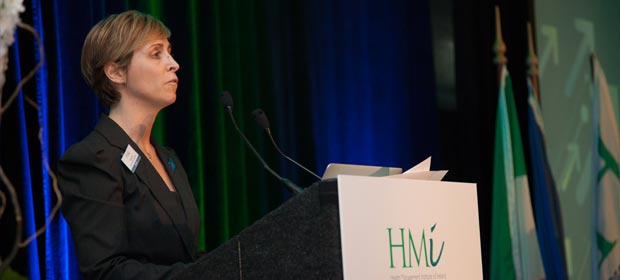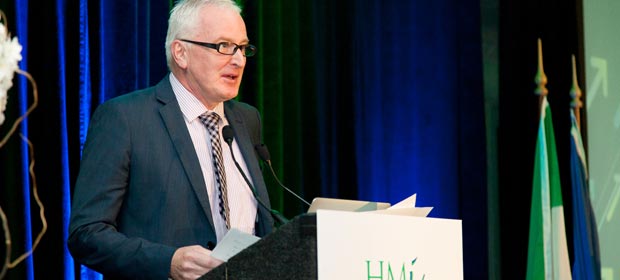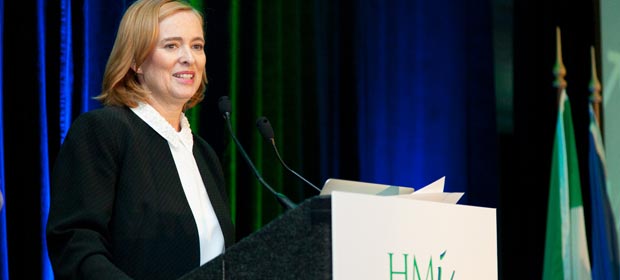A panel discussion on the challenge of governance, effectiveness and accountability in the new hospital group structures was one of the most stimulating sessions of the Conference.

Chaired by Ms Claire Lord, Partner, Mason, Hayes & Curran Solicitors, it focussed on the challenges faced by Boards and CEOs of Hospital Groups without a statutory basis.

Mr. Liam Duffy, CEO of Beaumont Hospital, Dublin said that while he agreed that the groups needed to be underpinned by legislation it could be up to seven years before that was in place. “If we wait until then, I think the opportunity to make change will be lost. There must be something that allows us to give groups authority to manage budgets and look at transformation.”

He said that when the services of the Jervis Street Charitable Infirmary, which was under Charter, was being transferred to Beaumont, Jervis Street at first refused to go. Subsequently the Jervis Street site was sold and raised six million pounds which went into a charitable fund. “I have issues in that I think it should have gone into funding the services which were established.”
He said he thought that there had to be a parallel track by the new groups between developing the framework and the legislation. “We have started by having bi-monthly meetings between hospital managers. There are some big decisions to be made. Hospitals have to give way and take hits on some things but if that goes for too long you lose momentum.“
He said that if you looked at how people’s needs could be met, he did not think that at present the public system could step-up to that and he thought there was a lot to be gained from collaboration with the independent sector.
Mr.Eamonn Fitzgerald, CEO of the Hermitage Clinic and HMI Council Member said that it struck him that there was a golden opportunity for the independent sector to co-operate when purchasers would be agnostic about where they would be buying. “If the government still espouses Money Follows The Patient and Universal Health Insurance there is a real opportunity here to engage in something a little more radical.”
Dr. Tony O’Connell said there was no reason the public sector should not purchase from the private sector, if it was cheaper. “In a smart system you would make the most of capacity available. We can actually do that and we do not need a legislative system to do it. When I say contestability, I am not limiting myself to outsourcing. There is a whole range of possibilities “

He said that in Queensland legislation was put in place first and hospital groups then established so “we knew what powers they would have and what accountability would be. In Ireland we are to prove a concept would work.
“The Group CEOs effectively report to me which I do not want them to do. I want them to report to their Group Chairs, but there is no legislation for that.
“I think we need a legislative basis for how hospitals work together. It can be quite high level, but you need to know where the source of authority will be.”
He said that in the end it was all about working together and having a vision for how the group was greater than a sum of its parts.
Dr. O’Connell said that the Trusts’ shareholder would probably be the Minister and it would be up to the Minister to dismiss a Board if it was not performing. Ministers represented the people of the country and the shareholders would be the people of Ireland making their voice heard through their Minister.
Ms. Eilish Hardiman, CEO of the Children’s Hospitals Group said they were a little different from the other groups in that they were all voluntary hospitals, each having its own Chair and Board and were moving to a new building and satellite centres. It was also the only group saying it would be closing down some hospitals.

“There is a need to look at culture, vision and values. The three children’s hospitals are held in high esteem and it is important that this value based delivery system is incorporated into the shared culture in the new delivery system. We have concluded that for us to be integrated, primary legislation is necessary. I think the voluntary system is the nearest to how we want to work in future. “
She said the vision was not about getting bogged down in legislation but getting collaborative arrangements and other agreements working and have legislation to support it.
How would it be seen if a Board was serving a Minister and Government from a policy point of view when they should be looking down and serving the population for which they were funded. “Power bases should be driven on quality and good Boards delivery on quality within budget and don’t care what the Minister thinks.”

Mr. Tom Lynch, Chair of the Ireland East Hospital Group said they had looked at clinical governance across the board. “It will require a degree of co-operation and trust and I think our academic partner, UCD, will be very important. I welcome the opportunity of doing this on a non statutory basis. If it does not work, we can look at it again, but we have legislated too much for structures and structures do not always work.”
Mr. Lynch who is on the Boards of the Mater and St. Vincent’s Hospitals said: “We have to ensure hospitals are safe and fit for purpose and that requires very careful delineation between different levels of hospitals.”

